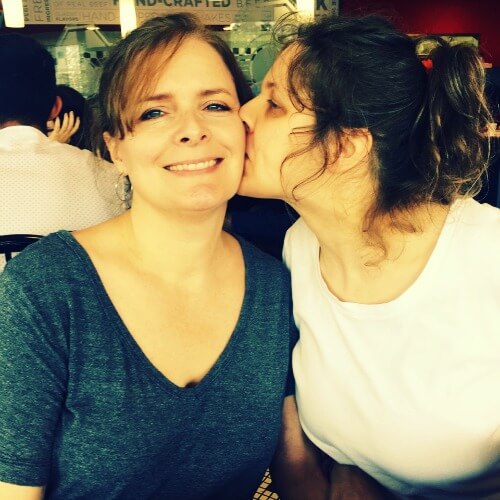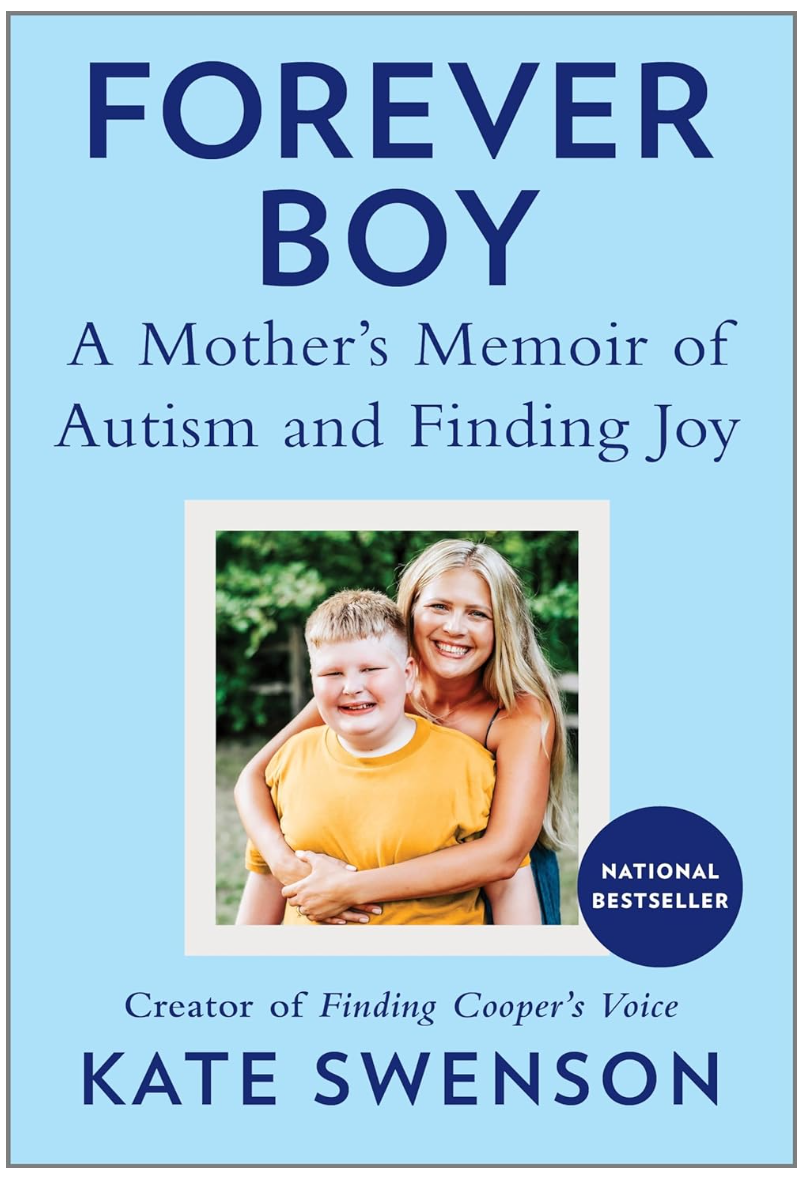Practical Goals, Measuring Success, and Accepting Limitations

I would like to introduce you to Jess, a 29-year-old woman with Autism and cortical blindness. Much like many of my favorite people, Jess came into my life in the virtual way. I stumbled upon her through Instagram. And I fell in love with this vivacious, funny, southern Belle. I asked her mother, Val, who blogs at Autistic Interpretations to write a post for Finding Cooper’s Voice. I hope that you all are as intrigued by Jess as I am.
My name is Val, and I am the mother of a 29-year-old with Autism and cortical blindness. This past week, I have been thinking a lot about how much self-care assistance my daughter requires every day; like with her shower. It seems just recently that it sunk in how I will help her with most aspects of bathing – forever. Once the realization sunk in for good, suddenly, helping her with her shower didn’t seem like the daunting task that it used to. Gone was the decades-long pressure of still trying to succeed at teaching her independence with this skill.
Here is where we currently stand:
THESE ARE OUR Biggie SUCCESSES with Daily Living Skills
- About 80% of the time, Jess can manage her own feminine hygiene needs
- Jess can dry herself after a shower
- Jess finally stopped dropping her towel in the floor (a recent success and something that drove me nuts)
- Jess can put on her own bra
- Jess can dress herself (not including shirts with buttons)
- Jess can get a cup out and get her own drink of water
THESE ARE MY (OUR) FAILURES with Daily Living Skills
- Jess cannot remember to close the shower curtain when she turns on the water
- Jess cannot bathe herself without constant verbal prompts and some physical assistance
- Jess cannot get shampoo out of a bottle without taking the lid off and dumping most of the bottle onto the top of her head
- Jess cannot use a razor to shave her armpits or legs
- Jess cannot adequately brush her own teeth
- Jess cannot properly brush her own hair
- Jess cannot put a hair clasp in her hair
- Jess cannot put her hair in a pony tail or clip of any kind
- Jess cannot fasten buttons
- Jess cannot prepare herself a simple meal
- Jess cannot use a knife to cut her food
- Jess cannot go down stairs with alternating feet. (both feet stop on each stair step)
- Jess cannot use a keypad to dial a phone (except for preprogrammed speed dial on her own phone)
- Jess still has bathroom accidents when she is stressed
But, are all of those really failures? Or, are they better described as a limitations? Not achieving an IEP goal does not have to mean failure.
Jess is limited. She is. Period. She reached her limits. Her limits did not reach my goals. Yes, mine. I needed her to reach those goals.
IEP’S, GOALS, MEASUREMENTS OF SUCCESS
Special-needs parents universally understand what this means. We live it for years, and years, and years… Kate just recently shared news about a successful IEP meeting in which everyone agreed that Cooper is very smart. Naturally, we are all proud of our children, as we should be. We know how smart they are. The brilliance is often trapped within and we search for ways to coax it out. In IEP meetings, we contribute ideas and push for goals that we feel are important, practical, and achievable. We understand like no one else what our own children are truly capable of and know that they can do it.
MEASUREMENTS
No progress – progress – and whatever % success. The measurements go something like that. As a parent of a younger child with Autism, do you ever stop and wonder if there comes a point where you have to accept there will not be a success on those same important, practical and achievable goals you pushed for? Like never ever? Can you imagine a time where you consciously decide, “That a goal will not be a success. It is a failure, so I’ll move on.” Sounds so negative doesn’t it? Failure. For a long time, that is how I used to view many of the goals where Jess never had success.
GOALS and OBJECTIVES
I spent all of Jessica’s school career, from age 4 to 21, reaching for the stars in all of those many IEP meetings. Jessica was completely capable of learning. She would be able to contribute to society. There would be a place where we would find her niche, where we could make it work. Because, she really is smart and perceptive. I pushed and pushed. We worked and worked toward it especially in her last few years of school and made true progress. But, did I overlook something utterly important in the process? During all of those school years, besides working on the academic goals then vocational goals, we also worked on Daily Living Skills. Those were biggies. But they were not a strong focus. Many of those things are difficult to work on at school. In addition, those tasks were seriously challenging, stressful, difficult, very time consuming. Life was hectic and full from morning until night, every day. Therefore, focusing on those daily living skills could wait a day, or two, or until next week, month, year.
FAST FORWARD A DECADE
As time was running out for Jess to stay in public school, I was reaching a pinnacle of stress. There were certain tasks that I really needed Jess to be able to achieve to have a successful transition from high school to ‘real’ world. Since I worked full-time and was a single parent, Jess needed to be able to be left alone to take care of herself for short periods of time. She needed to be able to prepare herself something to eat and to be able to stay safe. She needed to be able to use a mode of communication to call for help if needed. There were (are) no resources in my county for adults with Jessica’s level of special needs. Jessica’s self-help skills also mattered when it came to hiring a caregiver. The less she could do, the more I would pay, and the harder it might be to find someone.
Most importantly, I needed to be able to keep my job because I needed an income. Secondly, I wanted to keep my job. My own career had been put on hold while I was raising my children. I graduated from nursing school and began my career when I was 40! Nursing was intensely rewarding. The hard part was working 12 hours shifts on a med/surg cardiac-telemetry unit. We often cared for patients with multiple system failure. I loved my job, but it took more out of me than I can explain. Me not drowning. That was a big reason I needed Jess to be successful with self-help skills. So much to do, so little time, so little energy, etc. (I know you get it.)
For me to be able to keep my job, hire a caregiver, and not drown in tasks and responsibilities, I needed Jess to successfully master her daily living skills. She did not. Jess didn’t fail, she reached her limit.
HAVE YOU REACHED A LIMIT WITH A SPECIFIC TASK?
If you are a parent of a younger child, don’t give up! It’s too soon. Keep reaching for those stars. Keep trying because you believe with all your heart that the task can be achieved. I will never regret how hard I advocated, how deeply I believed, and how far I reached. I was not wrong in having that much faith in her abilities. We would have never gotten as far as we did without those beliefs and efforts. One day, if you decide an achievement is escaping you, try to not think of it as a failure. Instead, work on accepting that the limit has been reached on that particular task. Jess was well into her 20’s before I accepted that she had reached her limit with daily living skills. She will always and forevermore have to have help. It wasn’t until I figured out my own limitations (newsflash, I am really not superwoman) that I could step back and accept hers. With that acceptance I gained another piece of my own puzzle that, when completed, will be a beautiful picture of peace.
You can read more about Jessica’s Journey from birth to Transition Planning at http:// thetransitionaltruth.com/jessicas-journey-to-transition/ where the posts are listed in chronological order.
About the Author:
Valerie Brooks, BSN, RN, Lover of nature, photography, art, music and gardening. Stubborn, independent, and compassionate. Parent of a 3rd year med student, and a college junior majoring in American Sign Language /English Interpreting. Also parent of a low-functioning autistic 29-year-old with a cortical vision impairment.
Follow Val:
Blog – www.autisticinterpretations.com
Instagram – @autistic_interpretations
Facebook – https://www.facebook.com/autisticinterpretations/

